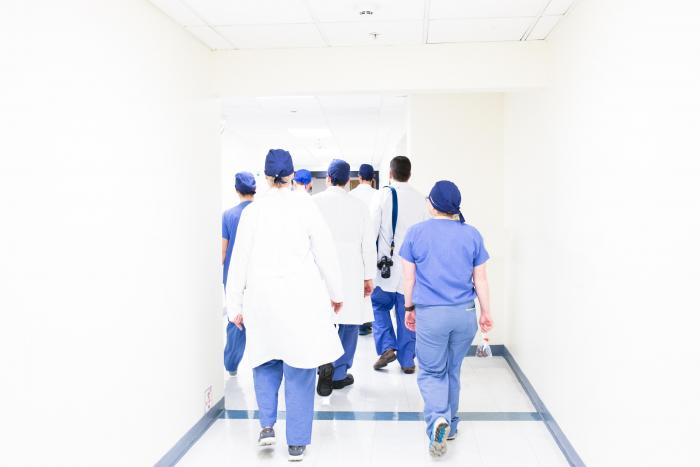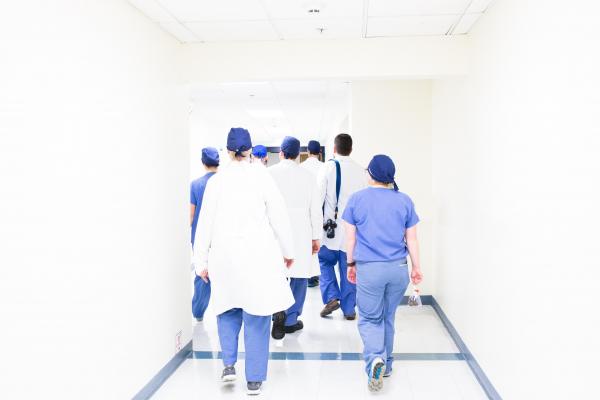
Clinical Technology (with placement year) BSc (Hons)
Bachelor's degree
In Bradford

Description
-
Type
Bachelor's degree
-
Location
Bradford
-
Duration
4 Years
-
Start date
Different dates available
Develop the skills you need for a career as a clinical technologist, capable of applying your knowledge to assist in the diagnosis, treatment and rehabilitation of patients. You will learn:
to design and manufacture medical equipment
tissue engineering and wound repair for making artificial organs
application, repair and maintenance of medical devices
to carry out physiological measurements, such as ECG, EMG, BMI, spirometry and skin analysis
You will specialise in three areas - renal technology (dialysis), rehabilitation engineering (prosthetics / orthotics), and medical technology/engineering.
Technological innovation in the field of medicine and healthcare is accelerating at an enormous pace. The modern hospital is now the centre of a technologically sophisticated healthcare system, and this requires equally technologically sophisticated staff. This mean you’ll be highly employable as a graduate.
A placement year in industry, taken in year three of the programme, enables you to build contacts whilst developing your skills and professional confidence.
Facilities
Location
Start date
Start date
About this course
Typical offer: BBC / 112 UCAS points
Reviews
This centre's achievements
All courses are up to date
The average rating is higher than 3.7
More than 50 reviews in the last 12 months
This centre has featured on Emagister for 15 years
Subjects
- Rehabilitation
- Design
- Mechanics
- Physiology
- Simulation
- Materials
- International
- Project
- Healthcare
- Technology
- Industry
- Engineering
- Medical
- Medical training
Course programme
The modules for this course can be found in the latest programme specification.
The programme is intended to help students develop a firm foundation in the engineering, science, design and technology of healthcare.
Year 1
- Technology Mathematics (20 credits) - core
This module develops a comprehensive/robust set of numeracy & algebraic skills fundamental to the majority of quantitative work in Engineering BSc courses. - Computer Aided Engineering (20 credits) - core
To provide an appreciation of computer aided design, analysis and simulation methods over a range of engineering disciplines (Chemical, Civil, Mechanical and Medical) and to provide experience of the use of industry standard CAE tools through design, modelling, simulation, analysis of structures, processes, systems or components. - Materials Technology & Structural Mechanics (20 credits) - core
Provides an introduction to engineering materials and their properties, with particular reference to their manufacturing technology, selection and different industrial applications. - Skills for Engineering (20 credits) - core
The module is designed to provide a project based hands on team based module with integrates the learning from other modules during the first year. - Practical Electronics (20 credits) – core
To develop practical electronics knowledge & skills, including; reading & creating circuit diagrams, understanding the function of components, designing PCBs using CAD & developing lab documentation & soldering skills. - Anatomy & Physiology (20 credits) – core
To assist the students to develop their knowledge and understanding of the gross anatomy of the human body; cardiovascular and respiratory physiology; muscular-skeletal systems; cells and tissues; normal versus cancer cells; human fluid mechanics.
At the end of Year 1, students will be eligible to exit with the award of Certificate of Higher Education if they have successfully completed at least 120 credits and achieved the award learning outcomes.
Year 2
- Mechanisms for Design (10 credits) – core
The aim of this module is to introduce the basic theoretical principles which underpin the kinematics of mechanisms and to show how analytical and CAE simulation techniques are used in the design of mechanisms. - Digital & Analogue Electronics (20 credits) – core
To introduce analogue electronic devices and circuits, the principles of digital logic,and digital system design. - Biomechanics & Human Biodynamics (20 credits) – core
This module aims to provide an overview of how the human body experiences forces in static and dynamic situations, and how gait and posture is analysed and evaluated. It also aims to carry out the most important physiological measurements for the clinical assessment of the human body. - Healthcare Technology Project (20 credits) – core
To demonstrate the multiple elements required for a successful product design process from initial ideas to functional prototypes. - Equipment & Maintenance Management (20 credits) – core
Evaluate the fundamental principles of maintenance management, the various maintenance strategies and the associated requirements and benefits. - Cell & Tissue Biology (20 credits) – core
This module aims to provide a good understanding of human physiology and the ways in which cells and tissue interact with invasive medical devices and implants. - Engineering Statistics (10 credits) – core
To develop critical skills in statistical engineering data collection, analysis and presentation, empirical model building and validation in engineering.
At the end of Year 2, students will be eligible to exit with the award of Diploma of Higher Education if they have successfully completed at least 240 credits and achieved the award learning outcomes.
Final year
- Project (30 credits) - core
- Six Sigma for Business Excellence (10 credits) - optional
The students will be able to acquire a deep understanding of the theories and practices of six sigma and associated quality assurance and management principles, and directly apply them to a variety of product and service industries. - Medical Ethics & Regulations (10 credits) – core
Critical review of medical ethics and regulations within medical engineering. - Materials Failure Analysis (20 credits) – optional
This module builds on core knowledge of materials science & structural mechanics and aims to provide the integrated knowledge & skills to; - recognise the important failure mechanisms which lead to catastrophic structural failure under static & cyclic loading -select appropriate analytical methods. - Biomaterials with Implant Design & Technology (20 credits) – optional
- This module aims to develop the critical knowledge of base biomaterials and also aims to integrate and apply existing knowledge to implant design and technology and to apply general design procedures/methodology to medical devices such as joint replacements, including hip, knee and other joints.
- Renal Technology (20 credits) – optional
To bring together multidisciplinary aspects of prior learning to evaluate renal technology in terms of biology, mechanics, technology and healthcare. - Rehabilitation Engineering (10 credits) – optional
To critically evaluate corrective or assistive devices and prosthetics in patient rehabilitation with good understanding of the main bone, muscular and skeletal disorders, diagnosis and possible treatments. - Clinical Signals (20 credits) – core
To engender specialist knowledge and understanding of clinical signals measurement and analysis both in theory and practice. - Medical Instrumentation & Imaging (10 credits) – optional
To acquire a systematic and advanced knowledge of the methods of modern medical instrumentation, including image processing techniques.
Students will be eligible for the award of Honours Degree of Bachelor if they have successfully completed at least 360 credits and achieved the award learning outcomes.
Clinical Technology (with placement year) BSc (Hons)

